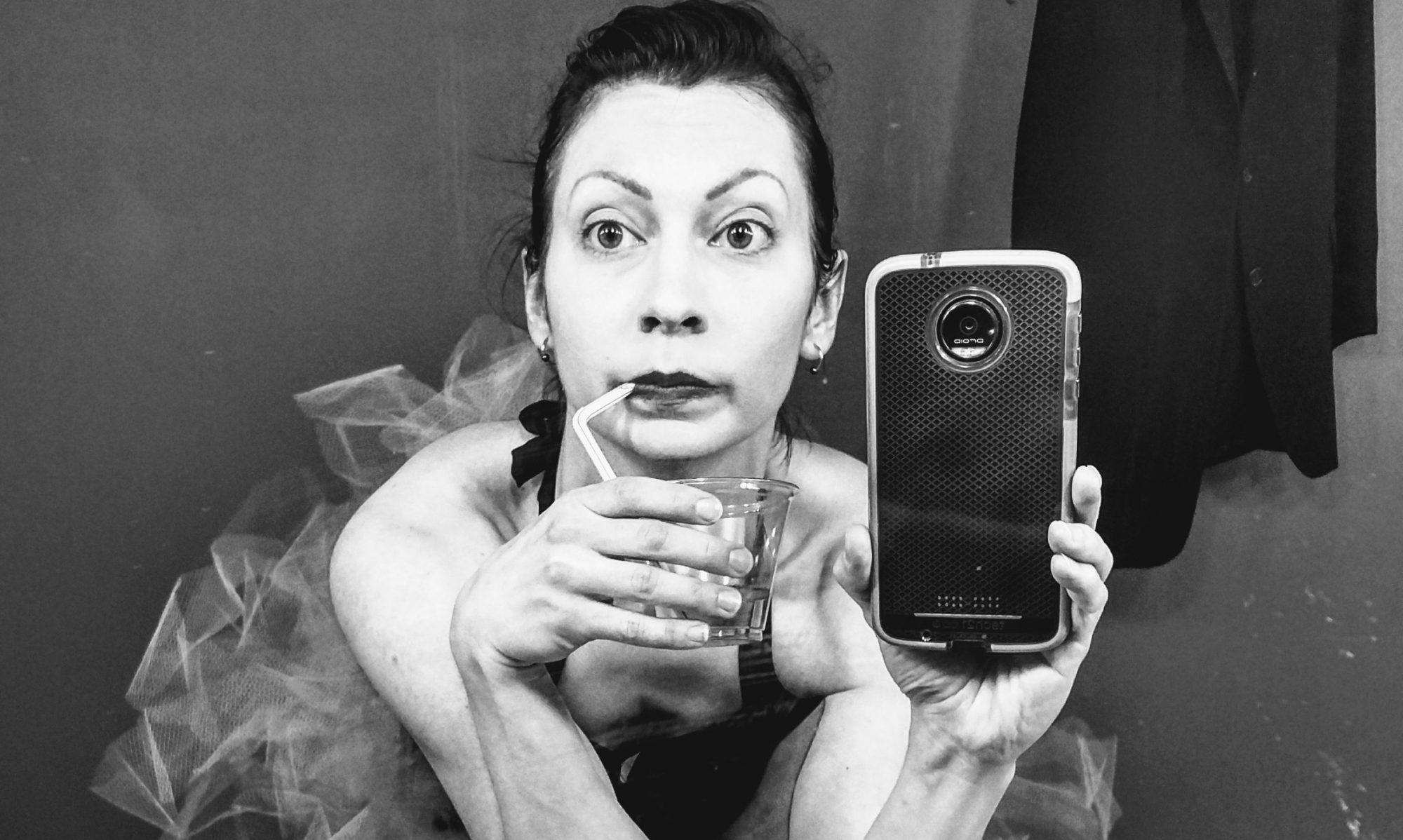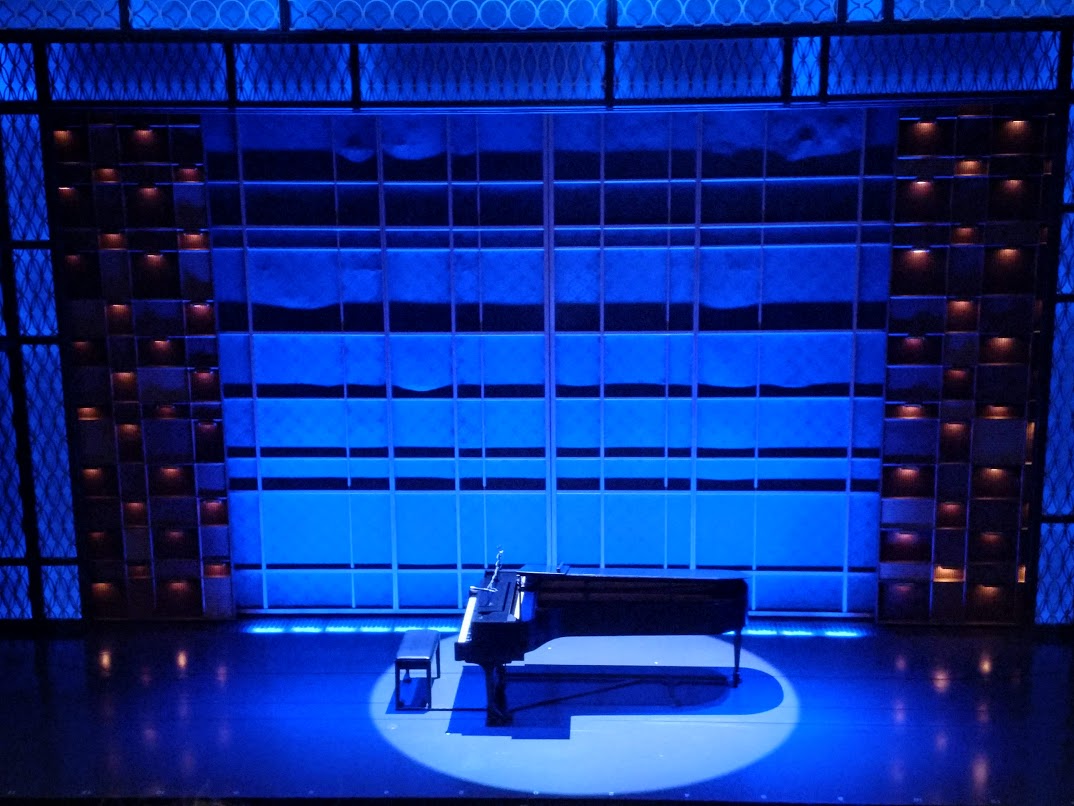(an essay)
A note to set expectations: what follows is not an “article.”
By no means is the content below a review of BEAUTIFUL. Listening to reader requests – as well as my most natural writing inclinations, I’ve been looking for an “opening” to begin blending some creative nonfiction into the site. In a case of fortunate timing: a recent revisit to The Carole King Musical gave me the nudge I needed…
“You know what’s so funny about life?
Sometimes it goes the way you want and sometimes it doesn’t.
And sometimes when it doesn’t, you find something beautiful.”
—Carole King (in BEAUTIFUL)
On a Wednesday evening in February 2016, I caught the National Tour of Beautiful – The Carole King Musical at Chicago’s Oriental Theatre.
It was the Tour’s final month in town; I was coming off a long day at my theatre, just four miles north.

I had sprinted in mid-winter slush from theatre to subway to theatre, dodging rush hour traffic while inelegantly chugging a crude dinner of scalding takeout bone broth that burned my mouth, clogged my throat – and now stained my parka. I’d purchased my ticket from work only hours earlier, scrambling to enter my credit card information in the final minutes preceding discount site deadline. I climbed up to the highest balcony and sank into my seat moments before curtain: sweaty, short of breath, (and unfortunately full-bladdered), I was eager to succumb to someone else’s story for a few hours. As the lights dimmed, (and the roof of my mouth began to peel), I surreptitiously slid off my Wildling-grade snow boots and exhaled for the first time in (what felt like) forever.
Nothing ranks higher on my list of guilty proud pleasures than the collective exhalation of an audience at the start of a show. No matter where each of us woke up that day, or what happened between that moment and this, we’ve all done whatever we had to do to get here, assembled into the same room, silent and orderly. Our reward: experiencing a story together – told live, right before our eyes. We don’t abandon our humanity at top of show, it’s quite the opposite: we call upon its most unifying features. No matter how disappointing the story may turn out to be, how rudely a seat-neighbor may behave, (how inconveniently-timed my bladder may alert me to its existence), that union of breath when the lights go down is unfailingly cathartic and ranks among my favorite moments of human connection.
The Oriental seats 2,253 patrons:
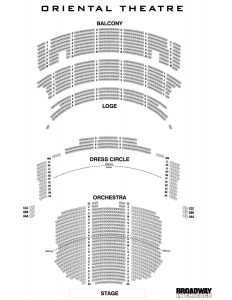
I believe I “saw” the show that night from the 2,253rd best seat in the house. Tiny blurs below taught me about Carole King’s journey of stumbling (back) into her own artistic voice, bookended by a wild-haired woman singing from the bench of a grand piano at Carnegie Hall. Way up in the far-end seat of a side balcony’s back row, the beautiful pain of her Tapestry brought me to tears.
From my point of view, she coulda been just about anyone – even me; for the next two-and-a-half-hours, I let her be. (She wasn’t, of course: post-show program reading on the train home verified that Abby Mueller had, in fact, played Carole King.)
In contrast to the Oriental, my theatre’s modest black box housed a maximum of 99 patrons per intimate performance. We operated out of a century-old church, located just off-Broadway – the Broadway in Chicago’s charming Lakeview East neighborhood that is, (complete with a Stars Hollow-worthy corner shop just across the street that sweetens its fresh roast coffee with homemade ice cream upon request).
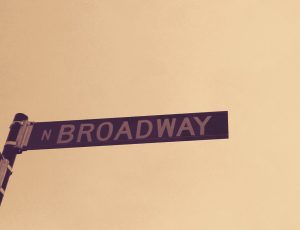
By the bleak midwinter of 2016, I had made my peace with the drastic pay cut I’d taken in shifting my career from DC-based litigation to Chicago-based arts admin – for the most part. The “status” demotion was a much harder pill to swallow.
The battle I fought – and ultimately lost – amidst career transition chaos: adjusting the currency by which I determined my own value and, consequently, the value I allowed others to assign me. (It probably didn’t help that I happened to land in a fundraising role…).
Surrendering my artistic voice didn’t happen overnight: I didn’t sing into any seashell in the hands of an octopus and – poof! – lose it all at once, in my presence, post-contract signing.
But the fact remained: my massive drop in salary had downgraded my worth in a massive way – literally, of course, but also societally: I’d gone from sought-after Board-bait… to the staff member who collects RSVPs, takes meeting minutes, slowly coming to realize that her name no longer seems worth remembering. The decision I’d made three years prior to leave the corporate world had lost me noticeable credibility, respect – and, subsequently, self-confidence.
By the time I landed in my theatre full-time, I’d been rejected from hundreds of jobs – including one at the very same theatre – despite nearly eight years of solid professional experience. The problem? That experience came, overwhelmingly, from Detroit and DC-based criminal and immigration litigation. I lacked the industry experience and insider knowledge required for any manager position, and the highly-coveted mid-level spots on theatre staffs typically came from internal promotions (which makes sense, I’d probably play it the same).
Perhaps my biggest problem: no one – myself included – looked at my résumé and thought: “entry level.” A major consequence of that problem: I’d spent the bulk of my Big Law Firm salary paying off crippling private student loan debt – failing to predict the year-plus under-employment period that followed my enthusiastic arrival in Chicago, champing at the bit to make the transition from law to arts admin.
Caught under a riptide of rejection, I concealed, diluted, and ultimately surrendered my worth, accepting any seat offered in the game of musical chairs that is Chicago nonprofit theatre. Still, I was lucky to land at all – and luckier still to land where I did: in a newly-built position on the (now) 2-person development staff of a small equity theatre – whose history-focused work inspired me tremendously.
During my years as a fundraiser, I relegated most of my thoughts to a series of notebooks – I filled an alarming number with everything from data-heavy research notes to lyric ideas inspired by staff meetings. Beyond that, an overwhelming majority of what I learned about nonprofit management and the business-side of theatre – connected to my years of legal experience – became my unintended secret. (So did the fact that I was writing songs.)
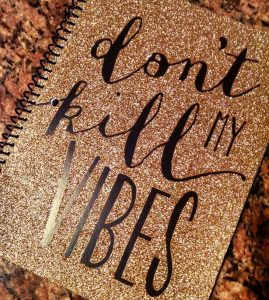
February fell in the heart of gala season, and in 2016, I was hard at work helping to recreate the “1977” – specifically the Opening of Studio 54 – for our history-conscious donors and their (hopefully-soon-to-be-donor) guests. On the morning of Wednesday, February 3, I’d worked from my backstage office space –while a student matinee performance of Dominique Morisseau’s Sunset Baby played out on the other side of my wall.
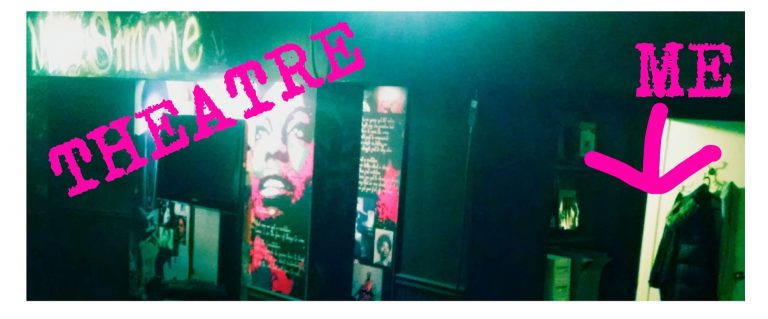
Working – quite literally – behind-the-scenes in that church-covered-theatre marks the singular instance in my life when I was (usually) happy about thin walls. This particular day provided a perfect example, when the office noise underscoring my morning quart of coffee included live recitations of Ms. Morisseau’s words, delivered by the divine AnJi White; scene transitions marked by the soul-shaking voice of Nina Simone. Then, a post-show discussion between the cast and Chicago Public School students, relating the play to their own lives.
That noise, to my ears, was a Call to Worship. The sounds of Sunset Baby in particular connected me to a B-roll taping of The Color Purple’s Broadway revival I’d attended the previous fall – featuring voices that extended heaven down to West 45th Street, for those of us lucky enough to be inside the Jacobs Theatre come curtain time. (Not a day has since passed that I don’t spend at least a few seconds refreshing my memory of Cynthia Erivo singing out: “I’m beautiful / AND / I’M / HEEEEEERE.” I want that sound swimming through me, marinating in my mind, forever.) Still, to date: Sunset Baby student matinees reign as my all-time favorite work soundtrack.
Student matinees frequently made my busywork go faster – quite possibly inspiration seeping through my thin office wall boosted adrenaline-levels in my brain. I determined late-afternoon on February 3rd that I could make a 7:30 curtain and finally catch Beautiful – before work got too crazy pre-gala and the Tour left Chicago.
Regrettably, I would attend packing an inflamed spinal cord, angry with arthritis. Now entering its third Chicago February, my spine had started a civil war within my body – armed with the knowledge that, this time, it had the option of a serene and financially stable life in Florida… but instead remained behind in Chicago, where it – I – slept alone for the first winter in a decade.
As it happened, my 2016 would come with a Mega-Pack of cruel challenges to overcome:
On just the second morning of the year – a month and a day before this last-minute date with Carole King’s musical, I had collapsed in Grand Central Station from pelvic pain, while traveling alone. To this day, I remain hazy as to how I made it to the Rite Aid (located mercifully inside the terminal), where a young pharmacist let me lie on the floor of her employee bathroom, and ultimately left her shift midway through to help me onto a train that would take me to my best friend’s side. Saved by the kindness of New York City strangers – and a childhood best friend.
The suicide of a beloved family member marked the year’s literal midpoint – complete with an out-of-state body to transport, two children left behind, and innumerable questions that would never be answered.
In a most punishing Grand Finale, my ten-year-old English Bulldog passed suddenly just before the year’s end – his “dad” and I raised him together since puppyhood.
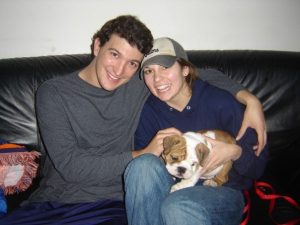
To pick him up, in mid-October in 2006, we’d driven from downtown DC to a sprawling Pennsylvania farm and back, all in an afternoon, my mom in the back seat (in from Detroit for a Barbra Streisand concert we attended two nights before). Dan and I had met not even four months prior, on a National Mall softball field, backlit by a stunning June sunset: we decided to take the plunge – to dog ownership – within a single change of season. For two sharp legal minds, it was a decision that lacked some major planning: we bought a majority of the essentials on the return trip – puppy (and Mom) in-tow; neither of our leases allowed for a puppy, (we didn’t live together, technically). Stonewall – as perceptibly gay as the famous Inn – was our 2006 summer love child. On that first drive home as a family, backlit by another gorgeous sunset, he fell asleep in the palms of my hands. My heart opened in ways I never knew possible – and I wasn’t alone.
Back to 2016, now a decade later: Stonewall had relocated recently to join his “dad” in Florida; I hadn’t hugged him since, (a truth I cried about nightly). The news of his death reached me by phone – immediately following a matinee of King Charles III I attended at Chicago Shakespeare Theatre. For the second time that year, I collapsed in public: this time on the concrete of Navy Pier’s parking garage, this time from heartbreak. My heart shattered in ways I never knew possible – and, once again, I wasn’t alone.
In retrospect, I involuntarily bookended 2016 with public displays of trauma, discovering new depths to human compassion in the wake of each.
…But those were traumas I could discuss openly – and had to, at least in headline, as each required time away from the office. Harder to manage were the unspoken pains, the ones that don’t come up naturally over coffee breaks or cocktails. Like the discovery of how inefficiently my arthritis-riddled body distributes heat come bedtime – followed by the 4am discovery that my half-baked solution of a heating pad shoved into a pillowcase lacks the lullaby provided by a loved one’s heartbeat.
Heat and a heartbeat: after enough years, that had become a mandatory part of the equation for my system to shut down. A brutal Chicago February spent inside an arthritic body attempting to sleep alone for the first winter in a decade doesn’t merit paid time-off from work in itself – but it should.
I’ve learned – out of necessity, sorry to say – that the stories of struggle prone to unfolding in the shadows are, ironically, the ones that require the most outside help. (They also make some of the best material for musicals, as Beautiful proves.) But I wasn’t thinking about any of that back in the winter of 2016. I only knew that my body hurt and I couldn’t seem to find sleep.
That winter, I spent sleepless nights creating a musical in my mind: it was based on a comic shown to me by a musician-friend the winter before, right around the time Dan’s much-deserved dream job had finally called for him – but in Tampa – just as a church-covered Chicago theatre had started opening its office to me. (I think it’s fair to say prosecuting cartels calls to Dan the way Cynthia Erivo’s Celie calls to me. …I had been waiting, praying – begging – for Tampa to call ME; it never did.)
The comic was short – but provided a perfect skeleton to adapt for the stage: its story conjured uplifting magic out of human desperation, simultaneously firing every synapse inside my dancer-brain.
Like Moana to the sea, it called me:
“A woman’s life plan is thrown off-course; she is devastated. Her husband loves her and wants to help – but she needs something he can’t seem to give her. When something inconceivable (and seemingly magic) sparks inside her – something her husband cannot understand – he struggles to trust her and questions her sanity (and it’s fair). She begins operating on instinct, him on fear. They grow apart.”
—JMS, Sarah and the Seed Project Notes, March 2015
The notes continue; the comic – and musical – end happily.
This woman’s struggle happened to be infertility – perhaps that was my initial entry point to the piece – but the story quickly grew into something much more universal through the filter of my musical-loving brain. It wasn’t a story about infertility, so much as a story about home and family. …At the same time, it felt strangely familiar.
“You know what’s so funny about life?
Sometimes it goes the way you want and sometimes it doesn’t.
And sometimes when it doesn’t, you find something beautiful.”
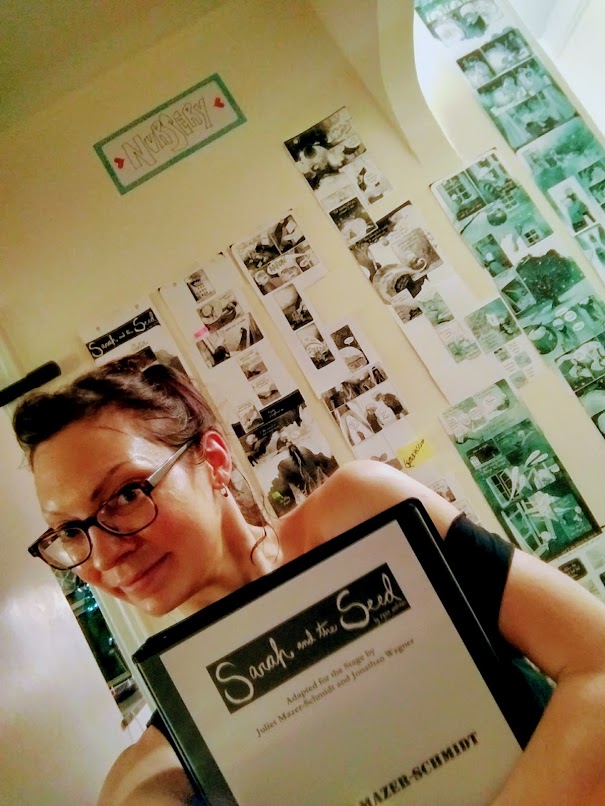
Last Saturday evening, I saw Beautiful a second time – 2 years, 7 months, and 13 days after my first.
This time I saw the show at Broadway’s Stephen Sondheim Theatre (with a capacity of 1,055 – about half the size of Chicago’s Oriental). As it happened, I attended, once again, via last-minute discount ticket purchase, arriving just before curtain – but this time walking over from eating pizza I’d consumed at an appropriate pace, (and an appropriate temperature), sitting beside loved ones.
Something I hadn’t known before stepping inside the Sondheim that night: the audience enters at mezzanine level. All those times I’d walked down West 43rd Street since my move to New York, something BEAUTIFUL had been at work beneath me the whole time: last Saturday I finally saw it with my own eyes – as Abby Mueller (the same actress I’d “seen” two years prior) once again embodied Carole King, reminding me once again that music is an excellent remedy for heartbreak.
I cried from a considerably better seat, with a considerably different life… and my own growing tapestry of songs.
Please send comments by email: I’d love to hear from you.
More JMSunderduress you may enjoy…
MY SPINAL COLUMN / PROLOGUE: WHAT’S IN A NAME?
